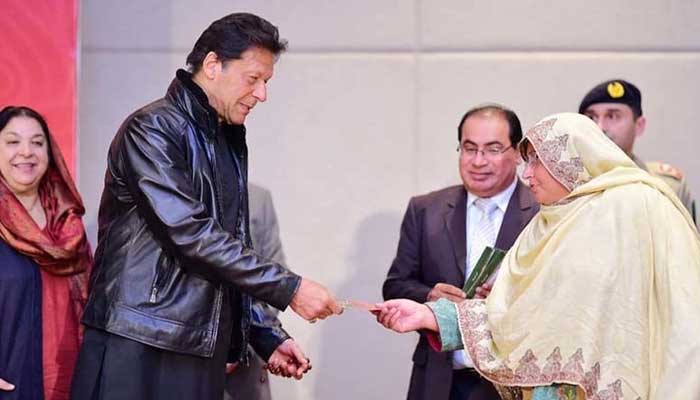Sehat Insaf Card: Free health facility for 80m people
The prime minister contended that the government was taking initiatives to ensure provision of education, health and justice and issuance of the Sehat Insaf Card to the poor was a step in that direction.
ISLAMABAD: Launching the Sehat Insaf Card Scheme for needy and poor segments of the society, Prime Minister Imran Khan said on Monday the prime objective of the government was to ensure provision of health, education and justice to the masses.
Under the health card scheme, around 80 million people or 10 million families would benefit in terms of angioplasty, critical surgery and cancer treatment. Around 15 million people will benefit from the scheme by 2021.
The prime minister contended that the government was taking initiatives to ensure provision of education, health and justice and issuance of the Sehat Insaf Card to the poor was a step in that direction.
He said the prime objective of the current government was to uplift the common man and alleviate poverty in the country while assuring that the government would do its best to provide the maximum facilities to people.
Imran Khan said a comprehensive poverty alleviation programme would soon be launched, wherein all the relevant organisations, including the Benazir Income Support Programme and Baitul Mal, would be working under one umbrella.
Under the Sehat Insaf Card Scheme, free healthcare worth Rs720,000 would be provided annually to each deserving family, he said and pointed out, “We first introduced the health cards in Khyber Pakhtunkhwa and it produced very good results. If any family member is suffering from a disease, the entire household budget gets disrupted and even research says that many poor families go below the poverty line just because of ailments".
The prime minister said it was imperative to provide health facility to the poor segments of the society. “In case a poor person falls ill and he hasno money for treatment, then it is injustice and such society faces the wrath of Allah Almighty,” he noted.
He was confident that the health cards would help alleviate poverty and said that the PTI government wanted to support and safeguard the poor segments of the society by issuing health cards.
Prime Minister noted that the scheme would be initially for Khyber Pakhtunkhwa’s tribal areas and the federal capital while Provincial Health Minister Dr Yasmin Rashid would ensure distribution of 10 million cards in Punjab.
"We will soon introduce a unified poverty alleviation programme which will be the first of its kind and include a number of organisations such as Baitul Mal and others under its umbrella," he announced.
Imran also announced that the government would introduce a scheme to give house loans to the poor. "We are working on a plan for improvement with already available resources," he said.
Regarding the current hike in price of commodities, the Prime Minister said, "Inflation was inevitable as rupee depreciated by 35% and accordingly dollar became dearer." He acknowledged the fact that the things were difficult when his party formed the government and adopted an approach for facilitating the people as much as possible. He said with the passage of time, there would be betterment, as the government would transform Pakistan into a welfare state.
“A welfare state, where facilities like education, health, employment and dispensation of justice is ensured,” he explained. Imran contended that there indeed were difficulties and it was because of a huge difference between imports and exports. He also added the government was mindful of the increase in utility tariff. “I again want to say that we are trying our level best to provide relief to masses as much as it is possible. Unless and until we spend on education and health, the society will not prosper but we are lagging far behind even India, Sri Lanka and Bangladesh in terms of our spending on these sectors,” he noted.
“We can earn $40 billion improving the tourism sector," he said while quoting a report, which was about Pakistan’s potential in various areas. On this occasion, the Prime Minister also distributed health cards among deserving people.
Speaking on the Insaf Card, Minister for Health Aamir Mehmoud Kiani said under this scheme, each deserving family would be able to get medical treatment worth Rs72,0000 annually and the card would cover treatment of all diseases except transplant.
He said it was the first time in the country's history that such a big package had been announced for the poor people and he added that 15 million people would be provided the health cards in the next two years.
The minister continued this scheme was being launched in Punjab, Kashmir, Gilgit Baltistan, Fata and the federal capital. He pointed out in the tribal districts, these cards would be provided to each family.
In Islamabad, 85,000 families would be provided with the cards and each card holder would also be provided transport charges of Rs1000 on every visit to the hospital. The minister said three new hospitals would be established in Islamabad and the existing health facilities were also being upgraded while budget had been allocated for this purpose.
Chairing a high level meeting at the Prime Minister Office (PMO), Imran Khan called for improved inter-provincial coordination as well as cooperation between the federation and provinces to address problems of common man through effective strategy and coordinated policies.
The meeting was attended by the top government leadership from Punjab and Khyber Pakhtoonkhawa including Chief Minister Punjab Usman Buzdar, Governor KP Shah Farman, Chief Minister Mehmood Khan and provincial ministers.
The Prime Minister said with the present government completing its six months in power and entering the second phase, there was a need to have better coordination between the federal and provincial governments.
He said there was a need to highlight the steps taken so far by the government for the betterment of country and masses. The Prime Minister said that the masses should be aware of the facts about what kind of Pakistan and the situation that was left by those who were making tall claims of development and speed. He mentioned the difficult economic situation when the PTI government took over the reign of country and said he was fully cognizant of the hardships being faced by people due to devaluation of rupee.
Minister for Planning and Development Makhdoom Khusro Bakhtiar, who was brought back from a political trip to Rahimyar Khan, briefed the participants about the future priorities of the government.
He told the meeting that in order to check the discrimination of regional development in different provinces, establishment of Regional Equalization Development Fund was under consideration under which the federal government in coordination with the respective provincial governments would take measures for the development of backward areas. He further said that with a roadmap being formulated to utilise the true potential of tourism, knowledge economy was also being promoted in line with the vision of Prime Minister Imran Khan.
The meeting was also briefed by the federal and provincial ministers of Punjab and KP about the measures taken so far in health, education, agriculture and other sectors. The Prime Minister was told that recommendations for the establishment of seven Industrial Zones in Punjab have been sent to the Board of Investment.
Minister for Finance Asad Umar told the meeting that the Board of Investment had been directed to formulate Special Economic Zones framework for tourism within the next 30 days. The Prime Minister was told that due to the efforts of the present government, the farmers in the whole of Punjab got for the first time full rate of their cane crop.
The meeting was further briefed that in order to promote edible oilseed crops including sunflower and canola, the growers were being provided with subsidies. The meeting was told that the process of giving Sehat Insaf Card in Punjab would be started from February 20 and in the first phase the people of Rajan Pur, DG Khan, Muzaffargarh and Multan would be provided with Sehat Insaf Card.
Process of the provision of Sehat Insaf Card to the people of 36 districts of Punjab would be completed by the end of 2019. The Prime Minister on this occasion directed to give special importance to agriculture sector with focus on its promotion, adding development of agriculture sector would help eliminate poverty.
He also directed to ensure provision of health facilities to people across the country with special focus on the quality of cleanliness in hospitals, adding hospital administrations should be given clear instructions that there would be no compromise on cleanliness. The Prime Minister also directed the ministers to visit the hospitals on regular basis.
Meanwhile, a meeting to review the steps and preparations in connection with further promotion of bilateral cooperation between Pakistan and Saudi Arab took place at the PMO which was chaired by Prime Minister Imran Khan.
The meeting was attended by Petroleum Minister Ghulam Sarwar Khan, Minister for Maritime Affairs Syed Ali Zaidi, Balochistan Chief Minister Jam Kamal, Chairman of Investment Haroon Sharif, federal secretaries and other high officials.
In yet another meeting of Task Force on Tourism, Imran Khan directed to finalise arrangements for commercial usage of 800 government rest houses in Punjab and another 157 in KP. He said that Bala Hisar fort in Peshawar will be made hub of tourism activities.
The meeting approved establishment of National Coordination Board to promote tourism, improve coordination between federal and provinces and to highlight country's tourism potential in the world.
Separately, Federal Minister for Information and Broadcasting Fawad Chaudhry said the federal government has fulfilled another promise by launching health card. Addressing a press conference alongside Federal Health Minister Amir Kayani here, he said the residents of Islamabad and erstwhile Federally Administered Tribal Areas (Fata) would benefit from the scheme at first.
-
 Cancer-stricken King Charles At Breaking Point?
Cancer-stricken King Charles At Breaking Point? -
 Andrew Leaves King Charles No More Moves To Play: ‘Can’t Just Say We Got Nothing’
Andrew Leaves King Charles No More Moves To Play: ‘Can’t Just Say We Got Nothing’ -
 Sterling K. Brown Explains How Sharing His Kids' Photos On Social Media Can Keep Them Safe
Sterling K. Brown Explains How Sharing His Kids' Photos On Social Media Can Keep Them Safe -
 Keir Starmer Gives Major Advise To King Charles Amid Andrew Scandal
Keir Starmer Gives Major Advise To King Charles Amid Andrew Scandal -
 Nick Reiner Pleads Not Guilty In Famous Parents' Double Murder Which Shocked The World
Nick Reiner Pleads Not Guilty In Famous Parents' Double Murder Which Shocked The World -
 Benicio Del Toro On Losing Mom In Chldhood: 'I’m Still Dealing With It'
Benicio Del Toro On Losing Mom In Chldhood: 'I’m Still Dealing With It' -
 More Than 500,000 Without Power As Blizzard Hits US Northeast
More Than 500,000 Without Power As Blizzard Hits US Northeast -
 Winona Ryder Lands Secret Role In 'Wednesday' Season Three, Marking Reunion With Tim Burton
Winona Ryder Lands Secret Role In 'Wednesday' Season Three, Marking Reunion With Tim Burton -
 Andrew, Fergie’s Life Without The Bells And Whistles Turns Grimmer: ‘A Lot More Was Happening’
Andrew, Fergie’s Life Without The Bells And Whistles Turns Grimmer: ‘A Lot More Was Happening’ -
 Nicole Kidman And Keith Urban's Divorce Drama Deepens As Teen Daughters 'stick' By Their Mother's Side
Nicole Kidman And Keith Urban's Divorce Drama Deepens As Teen Daughters 'stick' By Their Mother's Side -
 William, Kate Desperate To Make Public Statement Distancing Themselves From Andrew
William, Kate Desperate To Make Public Statement Distancing Themselves From Andrew -
 Charli Xcx Details Boozy Second Wedding To The 1975's George Daniel: 'Everyone Was Hungover'
Charli Xcx Details Boozy Second Wedding To The 1975's George Daniel: 'Everyone Was Hungover' -
 Gracie Abrams Follows 'Kylie Jenner Playbook' With Paul Mescal Romance
Gracie Abrams Follows 'Kylie Jenner Playbook' With Paul Mescal Romance -
 Dua Lipa Shares 'Love Letter' With New Boyfriend After Emily Ratajkowski Confirms Romance With Her Previous Beau
Dua Lipa Shares 'Love Letter' With New Boyfriend After Emily Ratajkowski Confirms Romance With Her Previous Beau -
 Brazilian Beauty Influencer Passes Away After Suffering 'medical Emergency'
Brazilian Beauty Influencer Passes Away After Suffering 'medical Emergency' -
 Sarah Ferguson Turns Into A Bulldozer With Beatrice, Eugenie: ‘Help Me Out’
Sarah Ferguson Turns Into A Bulldozer With Beatrice, Eugenie: ‘Help Me Out’




